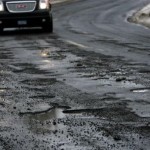 I’ve written extensively in recent years about the power of recombination, or taking something that works in one field, and applying it in another. A fascinating recent example comes via the University of Nottingham.
I’ve written extensively in recent years about the power of recombination, or taking something that works in one field, and applying it in another. A fascinating recent example comes via the University of Nottingham.
The project took its cue from the cooking world, and MasterChef in particular, to use sunflower oil to help repair roads. The work was the brainchild of Dr Alvaro Garcia, who witnessed a contestant on the show using the spherification technique, which is a jellification of a liquid to form spheres that have a resemblance to caviar when submerged in water. This sparked the idea of placing capsules of oil inside the asphalt that forms our roads. Then, when the roads start to crack, each capsule opens and releases the oil inside, which in turn softens the surrounding asphalt.
The idea that this helps the asphalt to ‘stick’ back together and thus fill in any cracks that are appearing.
“Our preliminary results showed that the capsules can resist the mixing and compaction processes without significantly reducing the physical and mechanical properties of asphalt and they also increased its durability. More importantly, we found that the cracked asphalt samples were restored to their full strength, two days after the sunflower oil was released,” Garcia says.
Self-healing roads
Garcia and his team believe that the solution could enhance the lifespan of a road by around one-third, with the cost of the solution roughly equivalent to that of other additives used in asphalt paving. In the UK alone, this could render savings of around £260 million per year.
“I previously worked on developing self-healing roads in the Netherlands and Switzerland that featured metal fibres. An induction heater would pass over the surface to melt the bitumen and fill in cracks in the roads, but the problem with that is you need a large machine, which is expensive and requires a road to be closed to traffic,” Garcia continues.
The project, which has been funded by Highways England, is now working to refine the geometry of the microcapsules to better understand how they degrade. This will help in the development of capsules with varying levels of strength that can function under different types of stress. Once tests have been successfully completed in the lab and in pilot trials, the team will trial the solution on the Highways England test bed during planned overnight maintenance before monitoring the solution for a couple of years to test its durability.
Smart roads
Suffice to say, this isn’t the only project that aims to make roads ‘smart’. For instance, a recent study highlights the potential for new road materials to de-ice itself, thus removing the need for authorities to grit the roads over winter.
Icy roads are the cause of a huge number of traffic incidents around the world each year, with winter maintenance costing huge sums each year.
Our traditional approaches to making our roads and pavements safe do a reasonable job but require constant maintenance to ensure roads are fit for vehicles to use.
The researchers developed a salt potassium formate that was mixed with the styrene-butadiene-styrene polymer and then added in with bitumen to be laid on the road.
Or you’ve got the team from Lancaster University, who are working on smart materials that allow the vibrations from vehicle movements to be captured and converted into electrical energy.
The project hopes to recover around 2 Megawatts for every km of road (under ‘normal’ traffic conditions). This would generate enough power for all of the street lamps on that stretch of road (for instance).
Whilst there is an obvious cost to install such functionality, the team believe the payback is swift. They estimate that the cost of powering that number of street lamps can be up to £3,500 per day, and the technology would cost just 20% of this.
“This research is about helping to produce the next generation of smart road surfaces,” the team say. “We will be developing new materials to take advantage of the piezoelectric effect where passing vehicles cause stress on the road surface, producing voltage. The materials will need to withstand high strengths, and provide a good balance between cost and the energy they produce.”
Whilst all of these projects are a little way from fruition, they nonetheless point to the significant progress being made in road materials that promise much more than the ‘dumb’ material we use today.